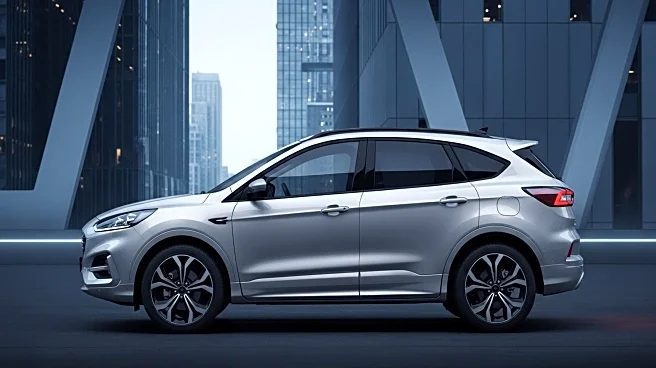What's Happening?
Ford Motor Company is set to end production of its Focus hatchback later this year, marking the end of a successful 25-year run in the compact car segment. However, the Focus nameplate may soon return as Ford plans to launch a new mid-size Focus crossover SUV by 2027. This new model is expected to be manufactured at Ford's Valencia plant in Spain, which has a production capacity of 300,000 units annually. The new Focus SUV will not replace the current Kuga model in Europe but will be sold alongside it, offering 'multi-energy' powertrain options, including hybrid and fully electric variants. The SUV will be built on Ford's C2 platform, which is also used for the Bronco Sport and Maverick in the U.S., as well as the Kuga in Europe.
Why It's Important?
The transition of the Focus from a hatchback to an SUV reflects broader industry trends where automakers are increasingly focusing on SUVs and crossovers due to their growing popularity among consumers. This strategic move by Ford could strengthen its position in the European market, where SUVs like the Puma and Kuga have already seen significant sales success. The introduction of hybrid and electric variants aligns with the global shift towards more sustainable automotive solutions, potentially enhancing Ford's competitiveness in the eco-friendly vehicle segment. The decision to manufacture the new Focus SUV in Spain also highlights Ford's commitment to maintaining a strong production presence in Europe.
What's Next?
Ford's plan to launch the Focus SUV in 2027 suggests a continued focus on expanding its SUV lineup, potentially leading to further innovations in vehicle design and technology. The company may also explore additional markets for the new Focus SUV, leveraging its existing platforms and powertrain technologies. As Ford prepares to close its Saarlouis plant in Germany, the transition to the Valencia plant could involve strategic adjustments in production and workforce management. Stakeholders, including consumers and industry analysts, will likely monitor Ford's progress in developing and marketing the new Focus SUV.
Beyond the Headlines
The revival of the Focus nameplate as an SUV could have cultural implications, as it represents a shift in consumer preferences and automotive design philosophy. The move may also influence other automakers to reconsider their strategies regarding classic models and their adaptation to modern market demands. Additionally, the focus on hybrid and electric powertrains underscores the automotive industry's ongoing commitment to reducing carbon emissions and promoting environmental sustainability.









